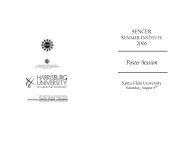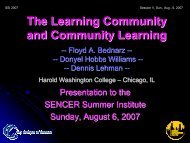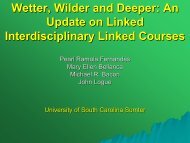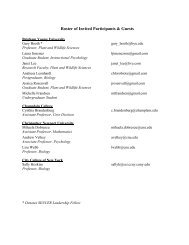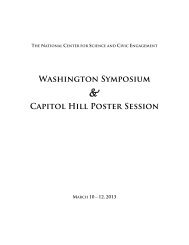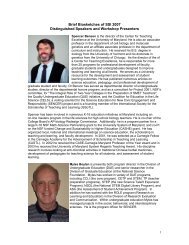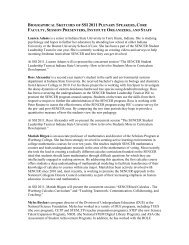Biosketches of invited speakers, Institute facilitators, and ... - SENCER
Biosketches of invited speakers, Institute facilitators, and ... - SENCER
Biosketches of invited speakers, Institute facilitators, and ... - SENCER
You also want an ePaper? Increase the reach of your titles
YUMPU automatically turns print PDFs into web optimized ePapers that Google loves.
aerospace <strong>and</strong> refrigeration industries, chemistry <strong>of</strong> lithium in solution <strong>and</strong> more traditional inorganic<br />
synthesis projects. Dave has applied <strong>SENCER</strong> ideas in the environmental chemistry course for the last<br />
several years with a significant increase in enrollment <strong>and</strong> attendance. He is currently attempting to add<br />
<strong>SENCER</strong> components into the general chemistry courses. He is interested in developing a <strong>SENCER</strong><br />
course on the chemistry <strong>of</strong> art <strong>and</strong> art restoration to be a part <strong>of</strong> the Integrated Natural Science Sequence<br />
at the University <strong>of</strong> Dayton.<br />
At SSI 2010, David will co-present a concurrent session entitled “Field Reports: Large Scale <strong>SENCER</strong><br />
Initiatives at Indiana State University <strong>and</strong> the University <strong>of</strong> Dayton.”<br />
Trace Jordan holds a bachelor’s degree in applied physics, a master’s in history <strong>and</strong> philosophy <strong>of</strong><br />
science, <strong>and</strong> a doctorate in chemistry. From 1994-1996, he was the John Dewey Fellow in science studies<br />
at the Eugene Lang College <strong>of</strong> the New School for Social Research in New York. He currently works at<br />
New York University (NYU) as associate director <strong>of</strong> the general education curriculum – the Morse<br />
Academic Plan. He teaches in <strong>and</strong> administers the Foundations <strong>of</strong> Scientific Inquiry program, a largescale<br />
core curriculum in mathematics <strong>and</strong> science for non-science majors. His work on the Energy <strong>and</strong> the<br />
Environment course at NYU was recognized as a <strong>SENCER</strong> model. Trace serves as a <strong>SENCER</strong> senior<br />
associate <strong>and</strong> is a member <strong>of</strong> the Leadership Council for the SCI-Midatlantic. He is the co editor-in-chief<br />
<strong>of</strong> Science Education <strong>and</strong> Civic Engagement: An International Journal. In addition to his work with<br />
<strong>SENCER</strong>, Trace has been a Project Kaleidoscope faculty member for the 21st Century since 1998 <strong>and</strong><br />
serves on the Programming Committee for the Chemical Education Division <strong>of</strong> the American Chemical<br />
Society. He also serves as Director <strong>of</strong> Special Projects for the Faculty Resource Network, a national<br />
consortium <strong>of</strong> schools that includes many minority-serving institutions. Trace received a Distinguished<br />
Teaching Award in 1996 <strong>and</strong> is a two-time recipient <strong>of</strong> the Golden Dozen Teaching Award from NYU’s<br />
College <strong>of</strong> Arts <strong>and</strong> Science (2006 <strong>and</strong> 2009).<br />
At SSI 2010, Trace will co-present a concurrent session on “Disseminating Your Work: The <strong>SENCER</strong><br />
Journal <strong>and</strong> Model Series.” He will also co-facilitate work sessions on “Designing a <strong>SENCER</strong> Course,”<br />
“Planning Next Steps <strong>and</strong> Accessing Resources,” <strong>and</strong> “What is Civic Engagement”<br />
Joseph J. Karlesky is the Honorable <strong>and</strong> Mrs. John C. Kunkel Pr<strong>of</strong>essor <strong>of</strong> Government at Franklin &<br />
Marshall College. He received his bachelor's degree from La Salle College <strong>and</strong> his PhD in public law <strong>and</strong><br />
government from Columbia University. He is co-author <strong>of</strong> The State <strong>of</strong> Academic Science: The<br />
Universities in the Nation's Research Effort <strong>and</strong> three editions <strong>of</strong> American Government, an American<br />
government textbook. He has also authored the monograph, Thinking About Environmental Policy. He<br />
has been a guest scholar at the Brookings Institution in Washington, DC <strong>and</strong> has served as a consultant<br />
for the Commonwealth <strong>of</strong> Pennsylvania on home rule for municipalities <strong>and</strong> on academic science policy<br />
for the State <strong>of</strong> Montana. He has served as associate dean for academic affairs at Franklin & Marshall <strong>and</strong><br />
as co-director <strong>of</strong> the University <strong>of</strong> Pennsylvania Master <strong>of</strong> Governmental Administration Program in<br />
Harrisburg. His teaching <strong>and</strong> research interests focus on public policy, particularly the interrelationships<br />
between public policy <strong>and</strong> science <strong>and</strong> technology <strong>and</strong> the consequences <strong>of</strong> these interrelationships for<br />
policies in energy <strong>and</strong> health. He is currently doing research on decision-making models <strong>and</strong> dry cask<br />
storage <strong>of</strong> spent nuclear fuel. His future research includes from the perspective <strong>of</strong> politics analysis <strong>of</strong> what<br />
makes public issues complex <strong>and</strong> contested <strong>and</strong> the limits <strong>of</strong> science in helping to resolve such issues. He<br />
regularly teaches courses in American government, underst<strong>and</strong>ing public policy, public policy<br />
implementation, <strong>and</strong> a seminar on health policy <strong>and</strong> serves as co-chair <strong>of</strong> the public health major at<br />
Franklin & Marshall.<br />
At SSI 2010, Joseph will co-present a concurrent session on “The Public Health Major in an<br />
Undergraduate Setting.”<br />
55



